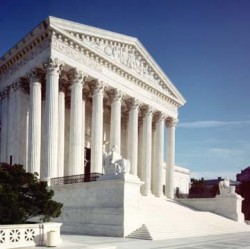 When Samantha Elauf showed up for her job interview at an Abercrombie & Fitch store wearing a hijab, it was a powerful hint the teenager might have religious convictions.
When Samantha Elauf showed up for her job interview at an Abercrombie & Fitch store wearing a hijab, it was a powerful hint the teenager might have religious convictions.
But with the company’s controversial policy which, among other things, spelled out a certain “look” that made no allowances for headwear, Elauf was turned down.
That rejection lead to a charge of employment discrimination by the Equal Employment Opportunity Commission and a $20,000 verdict against Abercrombie & Fitch. The verdict was overturned when the 10th Circuit Court of Appeals agreed with the company that Elauf first had to ask for a religious accommodation.
The U.S. Supreme Court rejected that thinking today, in an 8-1 decision that Justice Antonin Scalia said was, “Really easy.”
Speaking from the bench this morning, Scalia said, “Title VII forbids adverse employment decisions made with a forbidden motive whether this motive derives from actual knowledge, a well-founded suspicion or merely a hunch.”
In his written decision, joined by six other justices, Scalia explained further that, “An employer may not make an applicant’s religious practice, confirmed or otherwise, a factor in employment decisions.”
That Elauf never specifically requested a religious accommodation is immaterial, the court opinion said. “A request for accommodation, or the employer’s certainty that the practice exists, may make it easier to infer motive, but is not a necessary condition of liability.”
Justice Samuel A. Alito Jr. voted with the majority, but disagreed on that latter point, writing “an employer cannot be held liable for taking an adverse action because of an employee’s religious practice unless the employer knows that the employee engages in the practice for a religious reason.” In this case, he said, there was “ample evidence” the company knew Elauf is Muslim.
Justice Clarence Thomas dissented, opining that a company dress code, applied evenhandedly, was not discrimination.